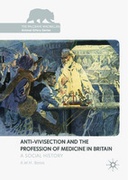Explore

Anti-Vivisection and the Profession of Medicine in Britain
A.W.H. Bates
2017
0 Ungluers have
Faved this Work
Login to Fave
This book is open access under a CC BY 4.0 license. This book explores the social history of the anti-vivisection movement in Britain from its nineteenth-century beginnings until the 1960s. It discusses the ethical principles that inspired the movement and the socio-political background that explains its rise and fall. Opposition to vivisection began when medical practitioners complained it was contrary to the compassionate ethos of their profession. Christian anti-cruelty organizations took up the cause out of concern that callousness among the professional classes would have a demoralizing effect on the rest of society. As the nineteenth century drew to a close, the influence of transcendentalism, Eastern religions and the spiritual revival led new age social reformers to champion a more holistic approach to science, and dismiss reliance on vivisection as a materialistic oversimplification. In response, scientists claimed it was necessary to remain objective and unemotional in order to perform the experiments necessary for medical progress.
This book is included in DOAB.
Why read this book? Have your say.
You must be logged in to comment.
Rights Information
Are you the author or publisher of this work? If so, you can claim it as yours by registering as an Unglue.it rights holder.Downloads
This work has been downloaded 99 times via unglue.it ebook links.
- 99 - pdf (CC BY) at OAPEN Library.
Keywords
- animal ethics
- Animal experimentation
- anti-cruelty
- Medical ethics & professional conduct
- Medical profession
- medicine
- Medicine: General Issues
- thema EDItEUR::M Medicine and Nursing::MB Medicine: general issues::MBD Medical profession::MBDC Medical ethics and professional conduct
Links
DOI: 10.1057/978-1-137-55697-4Editions

